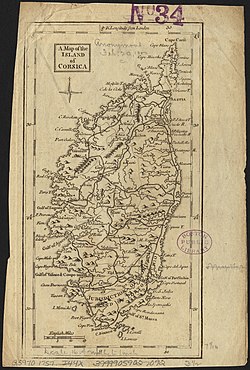Corsican Republic
| Corsican Republic | ||||||||||
| Repubblica Corsa | ||||||||||
| Unrecognized state | ||||||||||
|
||||||||||
|
||||||||||
|
Anthem Dio vi Salvi Regina |
||||||||||
|
Corsica in 1757
|
||||||||||
| Capital | Corte | |||||||||
| Languages |
|
|||||||||
| Government | Constitutional republic | |||||||||
| President | ||||||||||
| • | 1755-1769 | Pasquale Paoli | ||||||||
| Legislature | Diet | |||||||||
| Historical era | Age of Enlightenment | |||||||||
| • | Established | November 1755 | ||||||||
| • | Conquered | May 9, 1769 | ||||||||
| Area | 8,680 km² (3,351 sq mi) | |||||||||
| Currency | soldi | |||||||||
|
||||||||||
| Today part of |
|
|||||||||
In November 1755, Pasquale Paoli proclaimed Corsica a sovereign nation, the Corsican Republic, independent from the Republic of Genoa. He created the Corsican Constitution, which was the first constitution written in Italian under Enlightenment principles, including the first implementation of female suffrage, later revoked by the French when they took over the island in 1769. The republic created an administration and justice system, and founded an army.
After a series of successful actions, Paoli drove the Genoese from the whole island except for a few coastal towns. He then set to work re-organizing the government, introducing many reforms. He founded a university at Corte and created a short-lived "Order of Saint-Devote" in 1757 in honour of the patron saint of the island, Saint Devota.
A national parliament, or Diet, was composed of delegates elected from each district for three-year terms. Suffrage was extended to all men over the age of 25. Traditionally, women had always voted in village elections for podestà i.e. village elders, and other local officials, and it has been claimed that they also voted in national elections under the Republic.
The Republic minted its own coins at Murato in 1761, imprinted with the Moor's Head, the traditional symbol of Corsica.
...
Wikipedia



